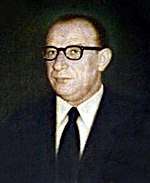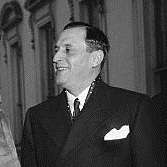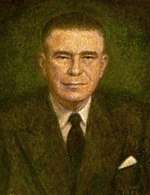1962 Costa Rican general election
General elections were held in Costa Rica on 4 February 1962.[1] Francisco Orlich Bolmarcich of the National Liberation Party won the presidential election, whilst his party also won the parliamentary election. Voter turnout was 80.9%.[2]
| ||||||||||||||||||||||||||
| Turnout | 80.9% | |||||||||||||||||||||||||
|---|---|---|---|---|---|---|---|---|---|---|---|---|---|---|---|---|---|---|---|---|---|---|---|---|---|---|
| ||||||||||||||||||||||||||
 In green provinces won by Orlich, blue by Calderón | ||||||||||||||||||||||||||
| ||||||||||||||||||||||||||
Legislative election | ||||||||||||||||||||||||||
This lists parties that won seats. See the complete results below. | ||||||||||||||||||||||||||
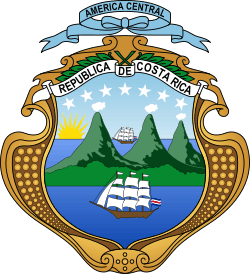 |
|---|
| This article is part of a series on the politics and government of Costa Rica |
|
Legislature
|
|
|
|
|
|
|
Background
During Mario Echandi’s presidency Rafael Angel Calderón, his family and supporters in exile, were allowed to return and a general amnesty was called for everyone involved in the still recent Civil War of 1948.[3] Calderón was elected Congressman in the 1958 election. But meanwhile in the past election the National Liberation Party was split due to the separation of the “Rossist” faction in this election Calderon’s candidacy unified PLN and other political allies into a strong anti-Calderonist ballot.[3]
Both former presidents Otilio Ulate from National Union and Calderón himself from National Republican became candidates. PLN’s candidate was, as in 1958, Francisco Orlich, one of the party’s founder, commander of one of the fronts during the civil war and Figueres’ close friend.[3]
A fourth small left-wing party named Popular Democratic Action led by socialist thinker Enrique Obregón also took part in the election nominating Obregon.[3] Communism was illegal according to the Constitution and Marxist Parties were not allowed, but Obregon’s party was officially socialist so the prohibition was not endorsed. Even so, Obregón did had the support of the traditional leadership and militancy of the (outlawed) Communist Party.[3]
Campaign
All parties promised land reform. Calderon’s publicity was particular in saying “Yesterday social reform, today land reform” taking advantage of the socialist reforms during his presidency.[3] As the Cuban Revolution was recent the anti-Communist speech was common. All main parties accused each other of having links with Communism; PLN because of its socialist ideology (social democracy) and Figueres alleged friendship with Fidel Castro and Calderón because of his previous alliance with the Communists in the 1940s.[3] The far-right anti-Communist group Free Costa Rica Movement paid for a strong anti-Communist propaganda, especially against Popular Democratic Action.[3]
Results
President
| Candidate | Party | Votes | % | ||
|---|---|---|---|---|---|
| Francisco Orlich Bolmarcich | National Liberation Party | 192,850 | 50.3 | ||
| Rafael Ángel Calderón Guardia | National Republican Party | 135,533 | 35.3 | ||
| Otilio Ulate Blanco | National Union Party | 51,740 | 13.5 | ||
| Enrique Obregón Valverde | Popular Democratic Action | 3,339 | 0.9 | ||
| Invalid/blank votes | 7,994 | – | |||
| Total | 391,406 | 100 | |||
| Registered voters/turnout | 483,980 | 80.9 | |||
| Source: Nohlen; Election Resources | |||||
By province
| Province | Orlich % | Calderón % | Ulate % | Obregón % |
|---|---|---|---|---|
| 49.1 | 36.7 | 13.3 | 0.9 | |
| 51.9 | 29.5 | 18.1 | 0.6 | |
| 56.7 | 30.8 | 12.1 | 0.5 | |
| 47.6 | 38.8 | 12.5 | 1.1 | |
| 43.9 | 42.2 | 11.9 | 2.0 | |
| 45.0 | 46.7 | 7.3 | 1.0 | |
| 54.4 | 33.3 | 11.7 | 0.6 | |
| Total | 50.3 | 35.3 | 13.5 | 0.9 |
Parliament
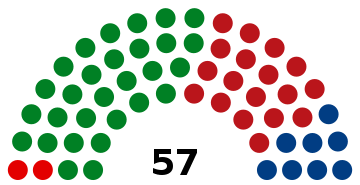 | |||||
| Party | Votes | % | Seats | +/– | |
|---|---|---|---|---|---|
| National Liberation Party | 184,135 | 48.9 | 29 | +9 | |
| National Republican Party | 126,249 | 33.5 | 18 | +8 | |
| National Union Party | 50,021 | 13.3 | 8 | -2 | |
| Popular Democratic Action | 6,256 | 2.5 | 2 | New | |
| Solidarist Action Party | 3,358 | 0.9 | 0 | New | |
| Alajuelan Party | 1,698 | 0.5 | 0 | New | |
| National Depuration Movement | 1,192 | 0.3 | 0 | New | |
| Guanacastecan Independent Union | 903 | 0.2 | 0 | New | |
| National Renewal Party | 125 | 0.1 | 0 | New | |
| Invalid/blank votes | 14,543 | – | – | – | |
| Total | 391,406 | 100 | 57 | +12 | |
| Registered voters/turnout | 483,980 | 80.9 | – | – | |
| Source: TSE; Election Resources | |||||
By province
| Province | PLN | PRN | PUN | ADP | PAS | PA | MDN | UIG | PREN | |||||||||
|---|---|---|---|---|---|---|---|---|---|---|---|---|---|---|---|---|---|---|
| % | S | % | S | % | S | % | S | % | S | % | S | % | S | % | S | % | S | |
| 47.1 | 9 | 34.4 | 7 | 13.0 | 2 | 2.6 | 2 | 2.2 | 0 | - | - | 0.8 | 0 | - | - | - | - | |
| 50.3 | 6 | 28.0 | 3 | 17.0 | 2 | 2.3 | 0 | - | - | 2.4 | 0 | - | - | - | - | - | - | |
| 56.2 | 4 | 29.8 | 2 | 12.8 | 1 | 1.2 | 0 | - | - | - | - | - | - | - | - | - | - | |
| 47.6 | 2 | 36.8 | 1 | 12.6 | 1 | 3.0 | 0 | - | - | - | - | - | - | - | - | - | - | |
| 42.9 | 3 | 40.1 | 2 | 12.1 | 1 | 4.9 | 0 | - | - | - | - | - | - | - | - | - | - | |
| 45.3 | 2 | 44.1 | 1 | 7.0 | 0 | 2.8 | 0 | - | - | - | - | - | - | - | - | 0.8 | 0 | |
| 52.3 | 3 | 32.2 | 2 | 11.9 | 1 | 0.8 | 0 | - | - | - | - | - | - | 2.8 | 0 | - | - | |
| Total | 48.9 | 29 | 33.5 | 18 | 13.3 | 8 | 2.5 | 2 | 0.9 | 0 | 0.5 | 0 | 0.3 | 0 | 0.2 | 0 | 0.1 | 0 |
Local governments
Vote percentage
| Parties | Popular vote | Alderpeople | Municipal Syndics | |||||||||||
|---|---|---|---|---|---|---|---|---|---|---|---|---|---|---|
| Votes | % | ±pp | Total | +/- | Total | +/- | ||||||||
| National Liberation Party (PLN) | 187,293 | 49.87 | +7.34 | 148 | +23 | 280 | +17 | |||||||
| National Republican Party (PR) | 126,849 | 33.78 | +12.87 | 93 | +46 | 42 | +19 | |||||||
| National Union Party (PUN) | 51,239 | 13.64 | -10.47 | 31 | -39 | 2 | -30 | |||||||
| Popular Democratic Action (ADP) | 6,643 | 1.77 | New | 2 | New | 2 | New | |||||||
| Solidarist Action Part (PAS) | 1,371 | 0.37 | New | 1 | New | 0 | New | |||||||
| Alajuelan Party (PA) | 724 | 0.19 | New | 0 | New | 0 | New | |||||||
| Guanacastecan Independent Union Party (UGI) | 550 | 0.15 | New | 0 | New | 0 | New | |||||||
| National Depuration Movement (MDN) | 470 | 0.13 | New | 0 | New | 0 | New | |||||||
| National Renewal Party (PREN) | 416 | 0.11 | New | 0 | New | 0 | New | |||||||
| Total | 375,555 | 100.00 | - | 275 | +21 | 324 | +4 | |||||||
| Invalid votes | 16,153 | 4.12 | ||||||||||||
| Votes cast / turnout | 391,708 | 80.93 | ||||||||||||
| Abstentions | 92,272 | 19.07 | ||||||||||||
| Registered voters | 483,980 | 100% | ||||||||||||
| Sources[4] | ||||||||||||||
Ballot
References
- Nohlen, D (2005) Elections in the Americas: A data handbook, Volume I, p155 ISBN 978-0-19-928357-6
- Nohlen, p156
- Hernández Naranjo, Gerardo. "Reseña de las elecciones presidenciales de 1962" (PDF) (in Spanish). Archived from the original (PDF) on 2016-02-16. Retrieved 13 April 2016. Cite journal requires
|journal=(help) - "Elecciones Regidurías 1962". tse.go.cr (in Spanish). Tribunal Supremo de Elecciones. Retrieved 21 May 2020.
